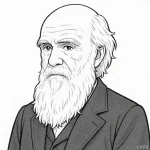“We may find in the long run that tinned food is a deadlier weapon than the machine-gun.”

- June 25, 1903 – January 21, 1950
- Born in India during the British colonial period
- Author, journalist
table of contents
Quote
“We may find in the long run that tinned food is a deadlier weapon than the machine-gun.”
Explanation
In this quote, George Orwell reflects on the hidden dangers of modern life and the ways in which society can be gradually harmed by seemingly innocuous elements, such as tinned food (or processed food). Orwell contrasts this with the more immediate, obvious threat of violence, symbolized by the machine-gun. While the machine-gun represents a direct and violent weapon of destruction, Orwell suggests that the slow, insidious nature of certain aspects of modern civilization—like industrialized food production—can have a much more lasting and deadly impact on human health and well-being. The quote can be seen as a critique of consumerism and the dependency on convenience and mass-produced goods, which might provide short-term ease but lead to long-term harm in terms of health, society, and individual autonomy.
Orwell’s concern with the potential dangers of consumerism and the rise of mass-produced food can be understood in the context of his broader critiques of industrialization and capitalism. In works like The Road to Wigan Pier, Orwell discusses the dehumanizing effects of industrial society, where individuals become cogs in a machine, dependent on systems that prioritize efficiency over human health or well-being. The focus on tinned or processed food in the quote might symbolize how societal systems can prioritize convenience and profit over quality of life or long-term sustainability, a theme Orwell saw as detrimental to human freedom and health.
This idea remains relevant today, as processed food and modern agricultural practices continue to contribute to widespread health problems, including obesity, heart disease, and environmental degradation. Orwell’s quote reminds us that the most dangerous threats to society are not always the most obvious or immediate, but rather those that develop slowly over time—such as the pervasive influence of consumer culture, unhealthy eating habits, and unsustainable production practices. His words encourage us to consider how the convenience of modern life, while seemingly harmless, can come with long-term consequences that may be just as devastating as more direct forms of violence.
Would you like to share your impressions or related stories about this quote in the comments section?




